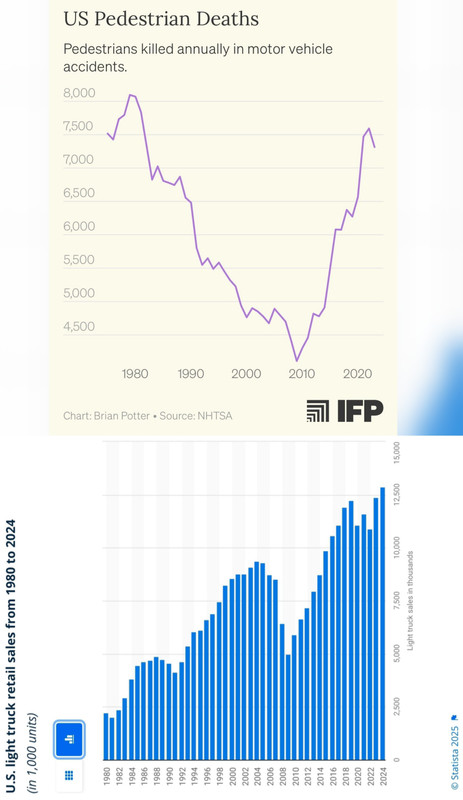2007/8 financial crisis had gas spike up to $5-8/gal in some instances. This caused a lot of people to sell their SUVs and get more economical vehicles.
In the mid 2010’s, gas prices came down substantially, and everyone bought more SUVs and traded in their economic vehicles.
SUVs kill pedestrians like bug zappers kill mosquitos on a damp, hot night in the swamp.
Drop starts in 1980, which was before SUVs, and after introduction of SUVs and popularity increase, kept dropping. I prefer the phone explanation, but don’t know why it started dropping in 1980. Maybe exodus to suburbs, and no pedestrians in suburbs?
I believe you might be trying to apply logic to the dates assuming there’s only one or two variables changing across all those decades. The truth is there are multiple strongly correlated reasons pedestrian deaths declined sharply in the US over the years.
In the 1980’s and 90’s it was largely the safety standards being improved in vehicles. ABS being standard helped with stopping before hitting people. Road safety standards and road designs improved to allow for more pedestrian walkways away from the streets. Automatic headlights at night turning on, better road conditions, better tires were introduced to handle different weather patterns more easily (e.g. in the rain or snow where traction loss could lead to pedestrian deaths) as well as standards to increase vehicle inspections and what safety standards were being checked during those inspections.
In the 2000’s, while many safety standards were still being improved and tweaked, a lot of the impactful ones had already been instituted, so the changes were less and less dramatic over the last 20ish years.
The specific question the OP was asking for was around the 2010 drop, and that is strongly correlated with high gas prices leading to sell-offs of SUVs, and SUVs are the leading cause of pedestrian deaths by far with modern cars with modern safety standards. Largely for the reasons others in this post have mentioned (larger, heavier, hood height, etc.).
I was very much a car nut during those years, and the gas prices drove many, many people to trade in their SUVs, trucks, etc. that had poor gas mileage. Gas prices were nuts, and a huge shock to everyone’s budget when it jumped up suddenly. This wasn’t really an inflationary thing, this was caused by a multitude of factors, but it stayed high for a long time due to those conditions.
When those conditions reverted, gas prices started falling like a rock, and everyone went back to thinking: “well, maybe I can afford that SUV again”. And they did. SUV sales rose sharply once gas prices fell. So pedestrian deaths have gone back up as a result.
Today, it’s also multiple factors, with the vehicle type being one of the large ones (hood height has been linked as a giant increase in the liklihood a pedestrian dies in a collision), but the other factor that rose sharply was smartphone use while driving from about the mid 2010’s to today. It’s probably the leading cause of vehicular deaths in general (I haven’t checked, but I’d throw $20 at it being distracted drivers).
We children of the 80s were out there in them streets, walking and biking to our friends’ houses and dodging the cars. Over the years our skills grew, and the numbers were finally on our side. And while it was sad on the rare occasion that we lost a friend to the streets as if they were an Oregon Trail character, it did help the numbers even more!
Trucks which are the most popular vehicles in the US got taller in the front
that’s also about the time “infotainment” systems started becoming common if not mandatory in cars. My 2003 S10 has physical switches for all of its controls, I can set the clock by feel. Newer cars with touch screen interfaces take drivers’ eyes off the road more than cars used to.
I’ve not seen people mention what probably is the actual case: the US government failing to handle the big changes in traffic like phone usage, change of vehicles sold, etc…
Different countries handled similar changes appropriately and deaths decreased, while the vehicle centric US did nothing to protect pedestrians/cyclists/…
The government, probably under influence from industry, is 100% to blame.
[https://www.statista.com/statistics/199980/us-truck-sales-since-1951/](If anyone is searching for an answer why.) Funny how it is almost the same curve.
Truck sales were increasing until about 2007 but road deaths only rose since ~2010. So I think it is clearly different curves.

Correlation is not causation
There could be a 3rd driving force that’s causing both trends, among other possible explanations
I think the general consensus is that bigger and more dangerous cars causes more pedestrian deaths.
I wouldn’t be surprised if that was the case
but a correlation (as presented in the first comment) is not a valid explanation (again, as is presented in the comment)
It’s good practice 👍🏼 but I probably go for the trucks explanation here
Why? The curves only correlate after 2010.
General increase in car ownership might explain both, more deaths and increased truck sales.
The size of cars exploded and bigger cars are less safe for pedestrians.
Caylynn got her license.
I vaguelly remember reading how SUVs are 70% more deadly in collisions with pedestrians than conventional cars.
(Because their front is flatter and taller, so pedestrians are less likelly to roll over the hood and instead tend to be projected away)
I believe those kinds of cars started taking off back then.
People buy SUVs because “safer” but they kill more pedestrians - and they’re not strictly safer for occupants either. Big SUVs have rollover risk. Crossovers aren’t necessarily any safer in a collision because it turns out that what really matters is the “area” of the car (length x width) and since crossovers and SUVs often cost more, you end up getting a smaller vehicle by area for the same amount of money. You literally get less for your money and it’s also less fun to drive and probably requires more fuel. I honestly don’t see why people without back issues get crossovers over wagons.
A crossover is the worst of both worlds
I am mostly in agreement with you but why would the area of the car matter? You can potentially have bigger crumple zones, but that’d exclude the space that is used for passengers. Other than that, the energy transferred in a collision is relative to the mass, where the lighter vehicle receives a larger proportion of the energy than the heavier one.
Crumple zones are one thing, but also there might be more distance between you and the door in a bigger vehicle, etc. So somehow that’s how it scales
My brother got his drivers license that year…
How many more must die for his bloodlust to be satisfied!?
LED headlights that blind everybody in front of them
Thanks Obama
Smartphones in general happened. Suddenly, everyone could look at porn anywhere, anytime and were distracted.
Smartphones happened in Europe too, but deaths kept going down here.
Sex isn’t as taboo in Europe so being able to see porn all the time didn’t have an impact.
You’re really going all in on the porn angle huh?
I like porn. 🤷♂️
And pickups grew about 2 feet taller.
Maybe that’s when someone cut the lower half of the graph?
Car manufacturers skirting emissions regulations by selling “work trucks” instead of regular cars.
The increased size of these trucks directly causes more fatalities
Thanks Obama!
/s








